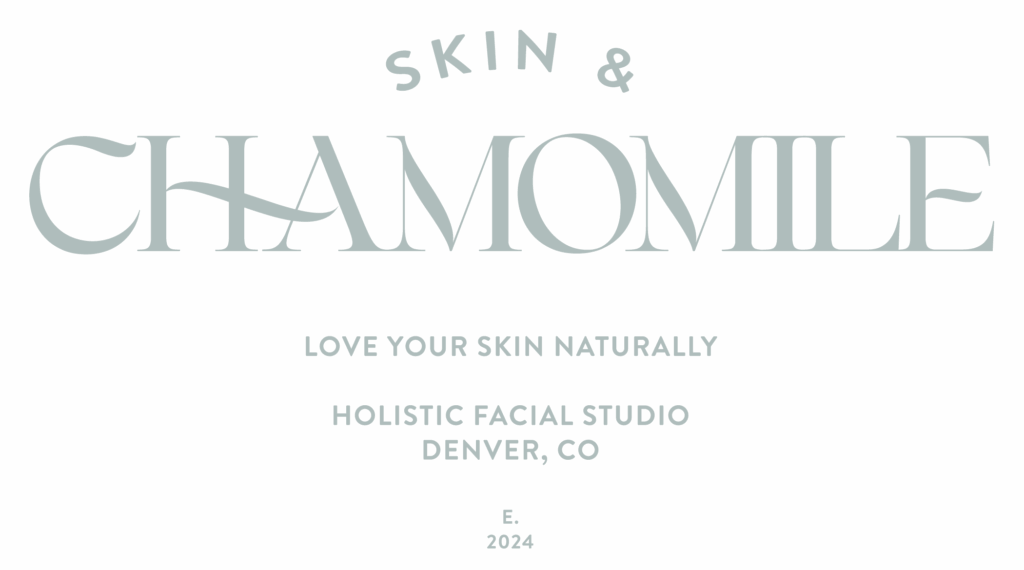Collagen Boosting Naturally: Your Guide to Glowing, Gorgeous Skin at Any Age
10/03/25

Collagen is the buzzword in skincare—and for good reason. This vital protein is the structural foundation of your skin, responsible for its firmness, elasticity, and youthful appearance. But here’s the challenge: starting in your mid-20s, your body’s natural collagen production begins to decline by about 1% per year. By the time you reach your 40s and 50s, that loss becomes increasingly visible in the form of fine lines, sagging, and loss of volume.
The good news? You don’t need invasive procedures or synthetic fillers to support your skin’s collagen levels. At Skin + Chamomile, we believe in working with your body’s natural processes—using organic botanicals, mindful lifestyle practices, and science-backed treatments to stimulate collagen production from within.
Let’s explore the holistic, natural approach to collagen boosting that supports radiant, resilient skin at any age.
Understanding Collagen: The Foundation of Youthful Skin
Collagen is the most abundant protein in your body, making up approximately 75% of your skin’s dry weight. It forms a strong, supportive matrix that provides structural support to keep skin firm and plump. This remarkable protein maintains elasticity, allowing skin to bounce back after stretching or movement, while also supporting hydration by helping skin retain moisture. Collagen promotes healing and aids in repair after injury or stress, and perhaps most importantly, it prevents sagging by maintaining facial contours and definition.
When collagen levels are healthy, skin looks smooth, supple, and youthful. When production slows and existing collagen begins to break down, you see the visible signs of aging: wrinkles, sagging, thinning skin, and loss of radiance.
What Causes Collagen Loss?
Several factors accelerate collagen breakdown, and understanding them is crucial for protecting your skin. Natural aging brings a decline in fibroblast activity—these are the cells responsible for producing collagen. UV exposure stands as the number one cause of premature collagen degradation, which is particularly concerning in Colorado’s high-altitude environment. Pollution and environmental stressors create free radicals that attack collagen fibers, while poor nutrition deprives your body of the essential nutrients needed for collagen synthesis.
Chronic stress elevates cortisol levels, which directly breaks down collagen. Smoking and alcohol both impair collagen production and accelerate aging, while excessive sugar consumption leads to glycation, a process that damages collagen structure. Dehydration, especially problematic in Colorado’s dry climate, further compromises collagen health. Understanding these factors is the first step in protecting and supporting your skin’s collagen reserves.
Natural Collagen Boosting from Within: Nutrition and Lifestyle
True collagen support begins from the inside out. What you eat, how you move, and how you manage stress all play critical roles in your body’s ability to produce and protect collagen.
Collagen-Supporting Nutrients
Vitamin C stands as perhaps the most critical nutrient for collagen synthesis. This essential vitamin is required for the enzymatic process that creates collagen fibers—without adequate vitamin C, collagen production simply cannot occur. You’ll find this vital nutrient in citrus fruits, strawberries, kiwi, bell peppers, broccoli, Brussels sprouts, and dark leafy greens. At Skin + Chamomile, we incorporate stabilized, organic vitamin C serums into our custom facials for maximum collagen-boosting benefits.
Amino acids form the building blocks of collagen, particularly glycine, proline, and hydroxyproline. Consuming protein-rich foods provides what your body needs to construct new collagen. Wild-caught fish, pasture-raised poultry, grass-fed beef, bone broth, legumes, and eggs all deliver these essential amino acids. Think of these foods as the raw materials your body uses to build strong, resilient collagen fibers.
Antioxidants protect existing collagen from free radical damage while supporting the production of new collagen. Berries, dark chocolate, green tea, colorful vegetables, and nuts and seeds all provide powerful antioxidant protection. These compounds act as bodyguards for your collagen, neutralizing the environmental threats that would otherwise break it down.
Omega-3 fatty acids deserve special attention for their anti-inflammatory properties. These healthy fats support skin structure, reduce the inflammation that breaks down collagen, and help maintain the skin’s lipid barrier. Wild salmon, sardines, walnuts, flaxseeds, and chia seeds are excellent sources. In Colorado’s challenging environment, these anti-inflammatory fats become even more important for maintaining skin resilience.
Trace minerals like copper and zinc serve as co-factors in collagen synthesis, helping to activate the enzymes involved in collagen production. You’ll find these minerals in shellfish, nuts, seeds, whole grains, and dark leafy greens. Similarly, sulfur-containing compounds support collagen formation and help maintain skin’s structural integrity. Garlic, onions, cruciferous vegetables, and eggs all provide this important element.

Hydration: The Foundation
In Colorado’s dry, high-altitude climate, proper hydration is absolutely essential for maintaining skin’s collagen structure. Water plumps the spaces between collagen fibers, helping them function optimally and giving skin that dewy, youthful appearance. Aim for at least eight to ten glasses of water daily, and consider herbal teas like nettle, horsetail, and chamomile as hydrating alternatives. Water-rich foods like cucumbers, watermelon, and leafy greens contribute to your overall hydration, while maintaining proper electrolyte balance supports cellular hydration at the deepest level.
Lifestyle Practices for Collagen Support
Quality sleep is non-negotiable for collagen production. During deep sleep, your body produces growth hormone, which directly stimulates collagen synthesis. This is when your skin does its most important repair and regeneration work. Aim for seven to nine hours of quality sleep each night, and consider your evening skincare routine as a ritual that signals to your body that it’s time to begin this healing process.
Stress management directly impacts your collagen levels. Chronic stress elevates cortisol, which breaks down collagen and accelerates visible aging. Incorporating daily stress-reduction practices like meditation or mindfulness, gentle movement like yoga or walking, and deep breathing exercises all help protect your collagen reserves. Regular facials serve as a powerful form of stress relief—the time you spend receiving nurturing touch and professional care reduces cortisol and creates the optimal internal environment for collagen production.
Regular physical activity increases blood flow and oxygen delivery to skin cells, supporting collagen synthesis throughout your body. Strength training is particularly beneficial because it stimulates growth hormone production. Yoga improves circulation while reducing stress, creating a dual benefit for collagen health. Walking or hiking takes advantage of Colorado’s beautiful outdoors while supporting your skin from within.
Sun protection cannot be overstated as the single greatest action you can take to preserve your collagen. UV damage is the number one external threat to collagen fibers. In Colorado’s high altitude, UV intensity is twenty-five percent stronger than at sea level, making diligent protection absolutely critical. Use a daily broad-spectrum mineral SPF of at least 30, wear protective clothing and hats when outdoors, and seek shade during peak hours between 10am and 4pm.
Topical Collagen Support: Botanicals That Work
While you cannot directly apply collagen to your skin—the molecules are simply too large to penetrate—you can use potent botanical ingredients that stimulate your skin’s own collagen production.
Vitamin C for Topical Application
Topical vitamin C stands as one of the most well-researched collagen-boosting ingredients in skincare. It directly stimulates collagen synthesis at the cellular level, protects existing collagen from UV and pollution damage, brightens skin and evens tone, and acts as a powerful antioxidant. The key is using a stabilized form in the right concentration, applied to clean skin before other products.
Retinol Alternatives: Bakuchiol and Rosehip
While traditional retinol effectively stimulates collagen production, it can be irritating and isn’t suitable for everyone. Natural alternatives offer gentler options with impressive results. Bakuchiol is a plant-derived retinol alternative that stimulates collagen production without irritation, making it suitable for sensitive skin and safe during pregnancy. Rosehip seed oil contains natural vitamin A compounds along with antioxidants and essential fatty acids that support collagen production and skin regeneration.
Peptides and Powerful Botanicals
Peptides are short chains of amino acids that signal your skin to produce more collagen. These compounds are gentle, effective, and work beautifully with other botanical ingredients. When applied topically, they communicate with your skin cells, essentially telling them to ramp up collagen production.
Gotu kola, also known as Centella Asiatica, has been used for centuries in Ayurvedic medicine for wound healing and skin rejuvenation. Modern research confirms it stimulates collagen synthesis, strengthens skin’s protective barrier, supports healing while reducing inflammation, and improves skin firmness and elasticity. This ancient herb beautifully bridges traditional wisdom and contemporary science.
Horsetail extract, rich in silica, supports both collagen and elastin production, helping maintain skin’s structure and resilience. Sea buckthorn offers concentrated nourishment with its vitamins C and E, omega fatty acids, and antioxidants that protect collagen while supporting skin regeneration. Calendula, a gentle healing botanical, reduces inflammation and supports tissue repair, creating an optimal environment for collagen production.
Professional Treatments for Collagen Stimulation
At Skin + Chamomile, we offer several advanced, natural treatments that stimulate your skin’s own collagen production.
Custom Organic Facials
Our signature facials are tailored to your unique skin needs and incorporate collagen-boosting botanicals carefully selected for your specific concerns. We layer vitamin C serums, peptide complexes, herbal extracts like gotu kola, horsetail, and calendula, and nourishing plant oils rich in essential fatty acids. Each facial includes lymphatic drainage massage techniques that support circulation, reduce inflammation, and create the optimal environment for collagen synthesis. These treatments feel deeply nurturing while delivering real, measurable results.
Procell Microchanneling
Microchanneling stands as one of the most effective treatments for stimulating natural collagen production. By creating controlled micro-injuries, we trigger your skin’s healing response and encourage the production of fresh, healthy collagen that continues to develop for months after treatment. This advanced therapy works beautifully within our holistic philosophy because it harnesses your body’s own regenerative power.
Facial Massage and Gua Sha
Regular facial massage, whether performed professionally or at home, stimulates circulation, reduces muscle tension, and supports collagen production. The gentle pressure and rhythmic movements increase blood flow and oxygen delivery, support lymphatic drainage, reduce inflammation, and promote cellular regeneration. This ancient practice delivers modern results while feeling absolutely luxurious.
LED Light Therapy
Red and near-infrared light therapy penetrates deep into the skin, stimulating fibroblasts—the cells that produce collagen—and supporting tissue repair. This gentle, non-invasive treatment complements other collagen-boosting approaches beautifully, adding another layer of support to your skin’s natural regenerative processes.
At-Home Collagen-Boosting Rituals
Between professional treatments, there’s much you can do at home to support your skin’s collagen production. Your daily skincare routine becomes a ritual of self-care and collagen support.
In the morning, begin with a gentle cleanse using lukewarm water, then apply vitamin C serum to clean, dry skin. This allows the vitamin C to penetrate effectively and begin its collagen-stimulating work. Follow with a hydrating botanical serum or face oil to seal in moisture and nourishment, then finish with mineral SPF to protect the collagen you’re working so hard to build.
In the evening, start with a double cleanse to remove makeup, sunscreen, and the day’s buildup. This ensures your skin is truly clean and ready to absorb the beneficial ingredients that follow. Apply collagen-supporting serums like peptides, bakuchiol, or rosehip oil, then use a rich, nourishing night cream or facial oil. Don’t forget your neck and décolletage—these areas show aging just as readily as your face and deserve the same attention.
Weekly treatments provide an additional boost. Exfoliate once or twice per week using gentle enzymatic or lactic acid treatments to remove dead cells and allow collagen-boosting ingredients to penetrate more effectively. Use hydrating, antioxidant-rich masks to nourish and support skin. Practice facial massage for three to five minutes, three to four times per week, using your fingertips, a gua sha tool, or jade roller to stimulate circulation.
Remember that collagen production is a gradual process. Consistent daily care, combined with periodic professional treatments, yields the best long-term results. Think of it as making daily deposits in your skin’s collagen bank account.
Collagen Support Across the Decades
In your twenties, focus on prevention and protection. Establish strong sun protection habits and use antioxidant-rich skincare. Build healthy lifestyle habits around sleep, nutrition, and stress management. Begin using vitamin C and gentle botanical serums, and start professional facials to support long-term skin health. What you do now sets the foundation for how your skin ages in the decades to come.
In your thirties, shift toward early intervention. Introduce collagen-stimulating ingredients like peptides and bakuchiol. Consider your first microchanneling series to give collagen production a significant boost. Prioritize stress management as life’s demands often increase during this decade. Increase your focus on hydration and omega-3 intake as your skin’s natural oil production begins to slow.
In your forties and beyond, embrace active support for your collagen. Layer collagen-boosting treatments and products for cumulative benefits. Commit to regular professional treatments, scheduling facials and microchanneling every four to six weeks. Focus on a nutrient-dense, anti-inflammatory diet that provides abundant collagen-building blocks. Emphasize barrier support and deep hydration as your skin’s needs evolve.
The key is to meet your skin where it is, with compassion and consistency, at every stage of life. Aging is natural and beautiful—supporting your collagen simply helps you age with vitality and grace.
Colorado Considerations for Collagen Health
Living in Colorado presents unique challenges for maintaining collagen. High altitude means increased UV exposure, making diligent protection and extra antioxidants essential. The dry air leads to chronic dehydration unless you’re intentional about water intake and using richer, more emollient skincare. Temperature fluctuations require supporting your skin barrier with nourishing botanicals. If you lead an active lifestyle, you need to fuel your body with collagen-supporting nutrients and prioritize recovery.
At Skin + Chamomile, we understand these challenges intimately and tailor our treatments and recommendations to support your skin in Denver’s unique environment.
About Skin + Chamomile
At Skin + Chamomile, we believe that radiant, youthful skin is your birthright at any age. Our holistic approach to collagen support combines the best of nature and science—organic botanicals, advanced treatments like Procell Microchanneling, and personalized care that honors your unique skin journey.
Located in Denver, we specialize in custom organic facials designed to stimulate your skin’s natural collagen production, support its resilience, and help you age gracefully with confidence and ease.
True beauty isn’t about fighting aging—it’s about nourishing your skin, supporting your body’s natural processes, and embracing each stage of life with radiance and grace.
Ready to boost your collagen naturally? Discover how our holistic approach can help you achieve firm, luminous, age-defying skin.
Book your collagen-boosting facial and start your journey to naturally radiant skin today.

References
Pullar, J. M., Carr, A. C., & Vissers, M. C. M. (2017). The roles of vitamin C in skin health. Nutrients, 9(8), 866. https://doi.org/10.3390/nu9080866
Varani, J., Dame, M. K., Rittie, L., Fligiel, S. E., Kang, S., Fisher, G. J., & Voorhees, J. J. (2006). Decreased collagen production in chronologically aged skin: Roles of age-dependent alteration in fibroblast function and defective mechanical stimulation. American Journal of Pathology, 168(6), 1861-1868. https://doi.org/10.2353/ajpath.2006.051302
Choi, F. D., Sung, C. T., Juhasz, M. L., & Mesinkovsk, N. A. (2019). Oral collagen supplementation: A systematic review of dermatological applications. Journal of Drugs in Dermatology, 18(1), 9-16. PMID: 30681787
Skin + Chamomile | Denver Facial and Skincare Studio
Located inside Nurture at 2949 Federal Blvd. Suite #210, Denver, CO 80211
Phone: 817-454-4059
Online Booking + Appointments: Click Here to Book

Hours:
Mon 8am – 7pm
Tues. 8am – 7pm
Weds. 8am – 7pm
Thurs. 8am – 7pm
Fri. 8am – 7pm
Sat. 8am – 7pm
Sun. Closed